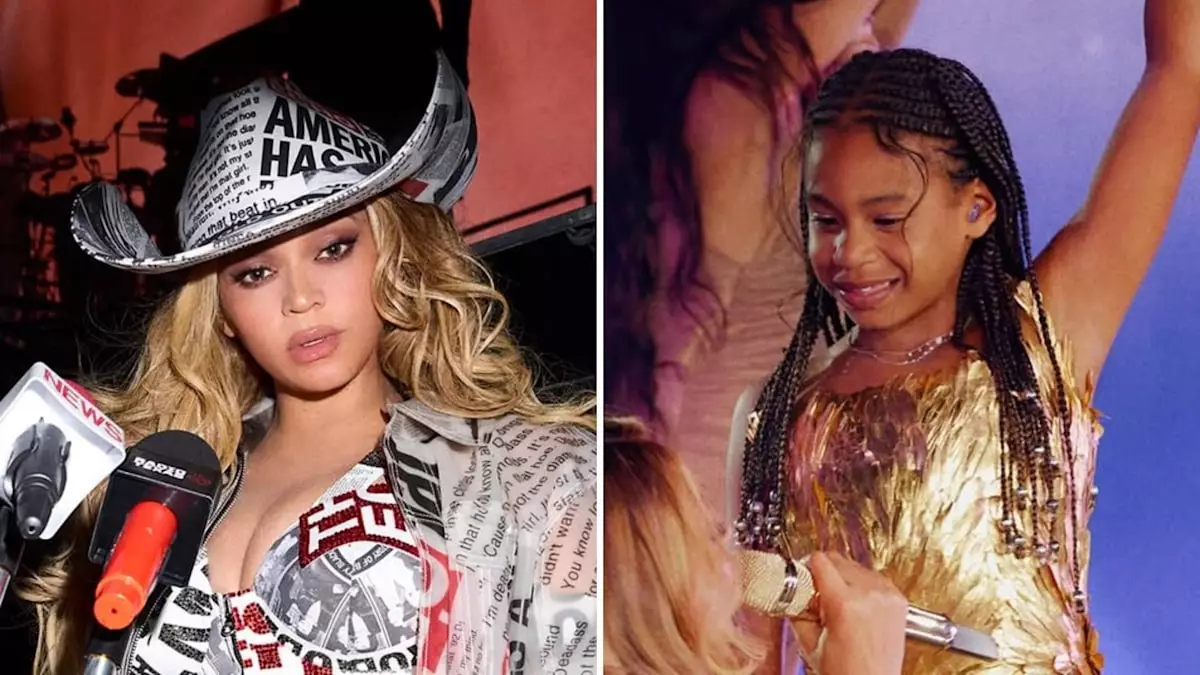In a world where celebrity dynasties reign supreme, the lineage of Beyoncé and Jay-Z stands out as a beacon of cultural influence. Their children carry the weight of immense expectations while also inheriting a natural flair for performance. Take Rumi Carter, for instance, who at just seven years old is already stepping onto the stage alongside her iconic mother. This phenomenon speaks not only to familial legacy but also to the nurturing of individual expression within the bounds of fame.
Rumi made headlines when she appeared with her mother and sister, Blue Ivy, during the Cowboy Carter Tour. Her on-stage presence is not just a testament to her lineage but a thrilling glimpse into the upbringing of a child soaking in the vibrancy of the entertainment industry. The question arises: how does a child navigate such a kaleidoscopic world of fame?
A Mother’s Protective Instincts
The curtain hasn’t merely lifted for Rumi; she has boldly stepped out into the bright lights with an enthusiasm that belies her young age. The driving force behind this decision, as revealed by Beyoncé’s mother, Tina Knowles, was none other than Rumi herself. “Every day, she said, ‘I want to go out there. I want to,'” Knowles recounts, shedding light on Rumi’s sheer determination.
This situation is remarkable for many reasons, particularly the way it highlights the dialogue between explicit protection and the genuine desire to perform. Beyoncé initially hesitated to allow her daughter Blue Ivy to take the stage, echoing a parental instinct to shield her children from the pressures of public life. In contrast, Tina’s encouragement symbolizes a different perspective—one that champions self-expression and creativity. It raises an intriguing point about parenting: How do you balance nurturing dreams while providing necessary boundaries?
Finding Normalcy Amidst Fame
What complicates the narrative further is the notion of normalcy in a life drenched in fame. Tina emphasizes that despite their celebrity status, Blue Ivy and Rumi remain “normal kids.” The dichotomy of growing up in a showbiz family while striving to maintain a semblance of an average childhood is complex. It’s a careful balancing act that the Carter family appears to manage adeptly.
Beyoncé’s approach to mothering is savvy and thoughtful. She is conscious of ensuring that her children experience the quintessential joys of a childhood, despite their extraordinary circumstances. This becomes evident, as Tina mentioned, through Rumi’s ability to be “just Rumi” off-stage, connecting with the simplicity of childhood as she balances the demands of fame.
The Thrill of the Stage
When Rumi appears onstage for performances of her mother’s heartfelt track “Protector,” her joy is palpable. She waves to the crowd with an endearing innocence that captivates audiences. The experience, she notes, “feels powerful”—a sentiment that aligns beautifully with the fulfilling connection between performer and audience.
This moment encapsulates what performance can be for many—an expression of inner strength and creativity. It is enlightening to witness a child revel in such experiences, suggesting that even in the canyons of celebrity, genuine delight can be found. As she prepares to usher in her birthday while touring in London, Rumi represents a new era of artistic expression through the lens of youthful wonder, inviting the world to cheer for her alongside her mother.
Encouraging Creativity in Youth
Ultimately, the strong influence of her family cannot be overlooked. Rumi’s journey into performance embodies a larger narrative about artistic expression and what it means to support children’s ambitions in today’s expansive landscape of fame and adoration. It challenges the traditional norms of parenting where caution often overshadows encouragement.
Even as listeners and spectators, we must appreciate the delicate dance between protective instincts and the empowerment that comes from allowing children to explore their passions. Allowing Rumi, and by extension, other kids in similar circumstances to share the stage could profoundly shape their identities, foster creativity, and ensure their voices are heard and celebrated from an early age.

